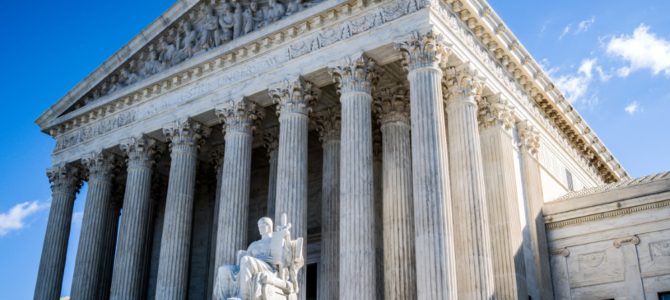
There’s always a risk in trying to predict how the U.S. Supreme Court will decide a case. Justices have proven to be unpredictable in the past, and court watchers will admit that with the Supreme Court, conventional wisdom is anything but conventional.
Still, there’s a buzz among the firearm industry and gun owners about the Supreme Court agreeing to hear an appeal in the case of New York State Rifle and Pistol Association v. Corlett. The Supreme Court granted review to a limited question: Whether the state’s denial of petitioners’ applications for concealed-carry licenses for self-defense violated the Second Amendment.
The court specifically wants to know if New York’s State Police Superintendent Keith Corlett is denying Second Amendment rights by rejecting concealed carry permits, as the state requires applicants to show a “justifiable need,” Could taking the case mean the time for concealed carry reciprocity has arrived?
NYSRPA v. Corlett is the first major gun-related case the Supreme Court has heard in more than a decade, following the McDonald v. City of Chicago decision in 2010, and before that, the District of Columbia v. Heller case decided in 2008. At the heart of the question in NYSRPA v. Corlett is whether the Second Amendment applies beyond the home.
The holdings in Heller and McDonald will inform how the Supreme Court decides NYSRPA v. Corlett. The Heller decision held that the Second Amendment — the right to keep and bear arms — are pre-existing individual rights.
Before Heller, gun control proponents argued the Second Amendment merely granted the right of the states to form a militia. The Heller decision put that notion to rest, holding that the people, not the government, retains the rights endowed by the Second Amendment. Furthermore, the Heller decision affirmed the belief that the right to bear arms can be viewed as among those rights endowed by our Creator and pre-existing the government.
The McDonald decision concluded that the Second Amendment applies not just to the federal government but to the states as well. Previous to McDonald, Chicago and nearby Oak Park, Illinois banned handgun possession. The Supreme Court held in McDonald that the Second Amendment is a fundamental civil liberty and self-defense is a basic right. Additionally, it held the states are obligated under the 14th Amendment Due Process Clause to not infringe on that right. Chicago couldn’t deny McDonald the right to keep and bear his handgun.
In light of NYSRPA v. Corlett, it’s worth noting the lengthy discussion about the right to “bear arms” contained in Heller. Writing for the majority, Justice Antonin Scalia agreed with Justice Ruth Bader Ginsberg’s articulation in an earlier case that the term “bear arms” means “‘wear, bear, or carry . . . upon the person or in the clothing or in a pocket, for the purpose … of being armed and ready for offensive or defensive action in a case of conflict with another person.’” The Second Amendment is, after all, grounded in the natural, God-given right of self-defense.
As such, just as all other fundamental civil liberties like free speech and freedom of religion are not confined to your home, the Second Amendment right to bear arms does not end at your front door — or your state’s border, for that matter.
While predicting Supreme Court decisions can be a fool’s errand, given the Supreme Court’s precedents it would appear likely the days of New York and a minority of states requiring citizens to prove “good cause” or a “need” to exercise their Second Amendment right to carry a firearm on their person for self-protection are numbered. Should the Supreme Court strike down these “may issue” requirements, then all states will be “shall issue.”
That’s where the Concealed Carry Reciprocity Act (H.R. 38/S. 1522), introduced by U.S. Rep. Richard Hudson, R-N.C., in the House of Representatives and by Sen. John Cornyn, R-Texas, in the U.S. Senate makes all the sense in the world. If all states are required to adhere to a “shall issue” policy, it only makes sense to treat concealed carry permits the same way individuals states treat driver’s licenses.
They would be honored across state lines, and states would still have the authority to set requirements to qualify and obtain them and when and where a concealed firearm can be carried. The alternative is requiring gun owners to carry a giant ring of 50 concealed carry permits in alphabetical order.
The Concealed Carry Reciprocity Act safeguards rights retained by the states, allowing each to determine their own laws while protecting the Second Amendment rights of all Americans. It means that the right to “keep and bear arms” does not end arbitrarily at a state’s border and such rights are equally accessible no matter what state a valid permit holder is in.
In reality, the Democratic Party controls both chambers of Congress and the White House. There’s little doubt that concealed carry reciprocity is not on the “must-do” lists of either House Speaker Nancy Pelosi, D-Calif., or Senate Majority Leader Chuck Schumer, D-N.Y. The Supreme Court, however, might be set to make their obstructionism moot.









